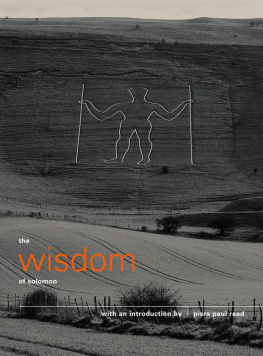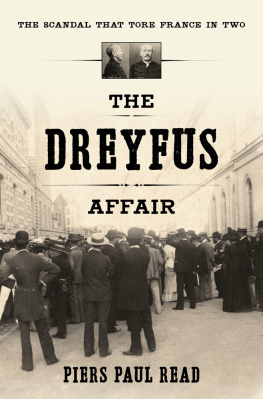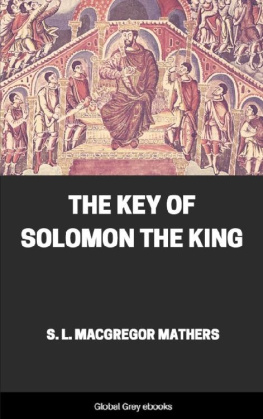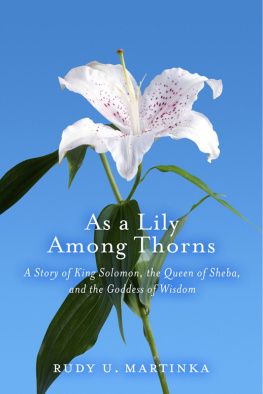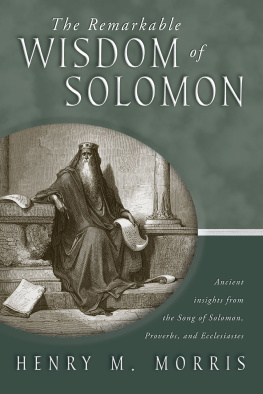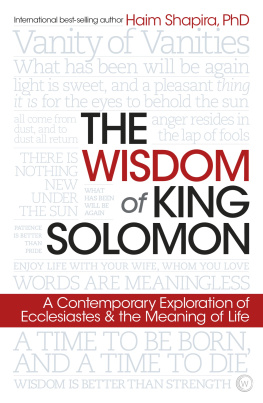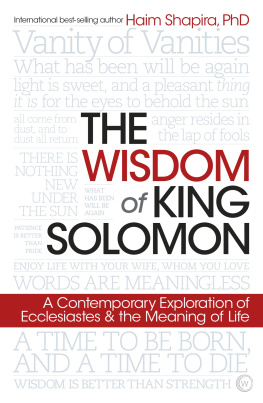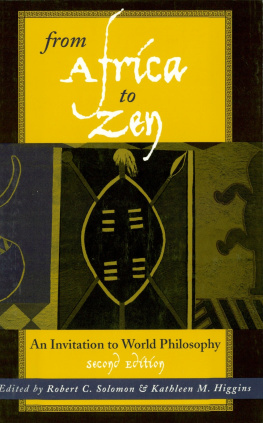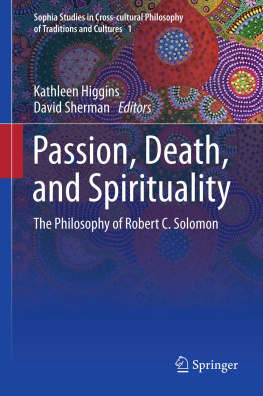Piers Paul Read - The Wisdom of Solomon
Here you can read online Piers Paul Read - The Wisdom of Solomon full text of the book (entire story) in english for free. Download pdf and epub, get meaning, cover and reviews about this ebook. year: 1999, publisher: Canongate Books, genre: Science. Description of the work, (preface) as well as reviews are available. Best literature library LitArk.com created for fans of good reading and offers a wide selection of genres:
Romance novel
Science fiction
Adventure
Detective
Science
History
Home and family
Prose
Art
Politics
Computer
Non-fiction
Religion
Business
Children
Humor
Choose a favorite category and find really read worthwhile books. Enjoy immersion in the world of imagination, feel the emotions of the characters or learn something new for yourself, make an fascinating discovery.
- Book:The Wisdom of Solomon
- Author:
- Publisher:Canongate Books
- Genre:
- Year:1999
- Rating:3 / 5
- Favourites:Add to favourites
- Your mark:
- 60
- 1
- 2
- 3
- 4
- 5
The Wisdom of Solomon: summary, description and annotation
We offer to read an annotation, description, summary or preface (depends on what the author of the book "The Wisdom of Solomon" wrote himself). If you haven't found the necessary information about the book — write in the comments, we will try to find it.
Traditionally believed to be written by King Solomon himself, though later attributed to his friends and followers, the author of the Greek text is well versed in the popular philosophical, religious, and ethical writings adopted by Hellenistic Alexandria. In his introduction, Piers Paul Read contemplates this story that impressed him greatly as a child, one in which wisdom pleases God so greatly he gives Solomon everything else besides.
The Wisdom of Solomon — read online for free the complete book (whole text) full work
Below is the text of the book, divided by pages. System saving the place of the last page read, allows you to conveniently read the book "The Wisdom of Solomon" online for free, without having to search again every time where you left off. Put a bookmark, and you can go to the page where you finished reading at any time.
Font size:
Interval:
Bookmark:
The Authorised King James Version of the Bible, translated between 160311, coincided with an extraordinary flowering of English literature. This version, more than any other, and possibly more than any other work in history, has had an influence in shaping the language we speak and write today.
Twenty-four of the eighty original books of the King James Bible are brought to you in this series. They encompass categories as diverse as history, philosophy, law, poetry and fiction. Each Pocket Canon also has its own introduction, specially commissioned from an impressive range of writers, to provide a personal interpretation of the text and explore its contemporary relevance.
Piers Paul Read, the third son of the poet and critic, Sir HerbertRead, is the author of thirteen novels and four works of non-fiction,among them Alive: the Story of the Andes Survivors. Hisnovels have won a number of awards, among them the HawthorndenPrize, the Somerset Maugham Award and the James Tait BlackMemorial Prize. Alive received the Thomas More Award forCatholic Literature in theus. He is a Fellow of the Royal Society ofLiterature and is vice-president of the Catholic WritersGuild. Hismost recent book, The Templars, is a work of history. He ismarried with four children and lives in London.
As a child I was greatly impressed by the story in the Bible of how King Solomon came to acquire great riches, and wealth, and honour and innumerable concubines and wives. God appeared to him in a dream and promised to give him anything he asked for. Solomon chose wisdom which so pleased God that he gave him everything else besides. Here was the formula, surely, for the God-fearing hedonist to have his cake and eat it.
Despite Solomons example, however, I suspect that few of us, if given the same opportunity, would make the same choice today. Wisdom has gone out of fashion. The very word is one of a number in the English language that we find frequently in works of literature but seldom in everyday life. In the half-century that has passed since I reached the age of reason, I can scarcely remember ever having heard a philosopher, statesman or indeed anyone else described as wise. Our most common terms of approbation tend to be intelligent, clever, astute, shrewd or high-powered. The skills of our rulers lie in reading the runes of focus groups and opinion polls, and the image they want to project is of someone vigorous, forceful, youthful, dynamic not wise. In the academic world, professors are appointed for their specialist knowledge, not their overall sagacity, and university chancellors are chosen more for their abilities as administrators and fundraisers than as the elders of their people.
Even philosophers who, from the etymology of the word that denotes their calling (love of wisdom), might be expected to give it some meaning, are no longer wise. Continental philosophers spew out incoherent gibberish while British linguistic philosophers have narrowed their focus to the point of irrelevance. The Professor who taught me at Cambridge was actually called John Wisdom but he restricted speculation in our seminars to how we could know whether or not our desks existed. Bertrand Russell and A J Ayer were undoubtedly highly intelligent men but, to judge from their private lives, could not be called wise.
What do we learn about wisdom from The Wisdom ofSolomon? Had I read it as a child, I would have been disappointed to discover that it is not a handbook on how to have your cake and eat it. Nor was it in fact written by Solomon: his putative authorship was as a commonly used literary convention. Modern scholarship suggests that it was composed by a Jewish sage living in Alexandria [in Egypt] in the first century before Christ. Alexandria at the time had a largely Greek population and an essentially Greek culture: The Wisdom of Solomon was written in Greek and quotes from the Greek version of Scripture but it is addressed to Jews reminding them of their special destiny and warning them against the spiritual and intellectual temptations that surround them mysterious cults, pagan rituals, sophisticated philosophical systems. It has none of the anguish of the Book of Job or the pithiness of Proverbs, but it is fascinating first as a text that was familiar to the first Christians and then as a critique of the kind of sceptical, hedonistic society that we find in the developed world today.
The influence of The Wisdom of Solomon on St Paul and the Christian Evangelists, particularly St John, make it a link between the Old and New Testaments. The description of Wisdom could be that of the Holy Spirit: For she is the breath of the power of God, and a pure influence flowing from the glory of the Almighty: therefore can no defiled thing fall into her. For she is the brightness of everlasting light, the unspotted mirror of the power of god, and the image of his goodness and remaining in herself, she maketh all things new: and in all ages, entering into holy souls, she maketh them friends of God, and prophets. (7:2527).
There is also the authors esteem for virginity: Better to have no children and to have virtue (4:1). Wherefore blessed is the barren that is undefiled, which hath not known the sinful bed: she shall have fruit in the visitation of souls. And blessed is the eunuch, which his hands hath wrought no iniquity, nor imagined wicked things against God (3:1314). This was a radical departure from the accepted notion in Judaism that fertility was a sign of Gods blessing and sterility a sign of his disapprobation; and it echoes the passage in St Matthews Gospel (19:12) where Christ blesses those who make themselves eunuchs for the sake of the Kingdom of God the text that justifies celibacy as a Christian ideal.
The Wisdom of Solomons critique of the permissive society of Alexandria in the first century BC goes some way to explain why, in an agnostic age, wisdom has gone out of fashion. To the author, God is the source of wisdom and it is vain to believe that we can reach a true understanding of our condition through the use of our own intellectual resources. For what man is he that can know the counsel of God? Or who can think what the will of the Lord is? For the thoughts of mortal men are miserable, and our devices are but uncertain. For the corruptible body presseth down the soul, and the earthy tabernacle weigheth down the mind that museth upon many things (9:1315).
Thus, to be wise, a man must be virtuous because sin blocks the conduit from God to man. A virtuous king will be a wise king and therefore a good king, benefitting the community he serves. But the multitude of the wise is the welfare of the world: and a wise king is the upholding of his people (6:24). The benefits of wisdom accrue also to the individual and those around him while the sinners families share their fate their wives are reckless, their children depraved, their descendants accursed.
However, the source of the happiness that comes with wisdom is not necessarily the riches, honour and triumph of a Solomon: wisdom will ensure that even if a man does not prosper in this life, he will find his reward in the next. Here we see how the Platonic distinction between body and soul solves the riddle posed by the earlier book of Job, and by our observation of the suffering of innocent people. In contrast to the prevailing Jewish view that prosperity and longevity are marks of divine approbation, the author warns the reader not to search for happiness in precisely those things that came to Solomon with his gift of wisdom honour, riches, concubines and wives. The first twenty verses of the second chapter are in fact a satirical apologia of those who believe that we should eat, drink and be merry for tomorrow we die. Our life is short and tedious the breath in our nostrils is as smoke Come on, therefore, let us enjoy the good things that are present: and let us speedily use the creatures like as in youth. Let us fill ourselves with costly wine and ointments: and let no flower in the spring pass by us (2:12, 67).
Font size:
Interval:
Bookmark:
Similar books «The Wisdom of Solomon»
Look at similar books to The Wisdom of Solomon. We have selected literature similar in name and meaning in the hope of providing readers with more options to find new, interesting, not yet read works.
Discussion, reviews of the book The Wisdom of Solomon and just readers' own opinions. Leave your comments, write what you think about the work, its meaning or the main characters. Specify what exactly you liked and what you didn't like, and why you think so.

